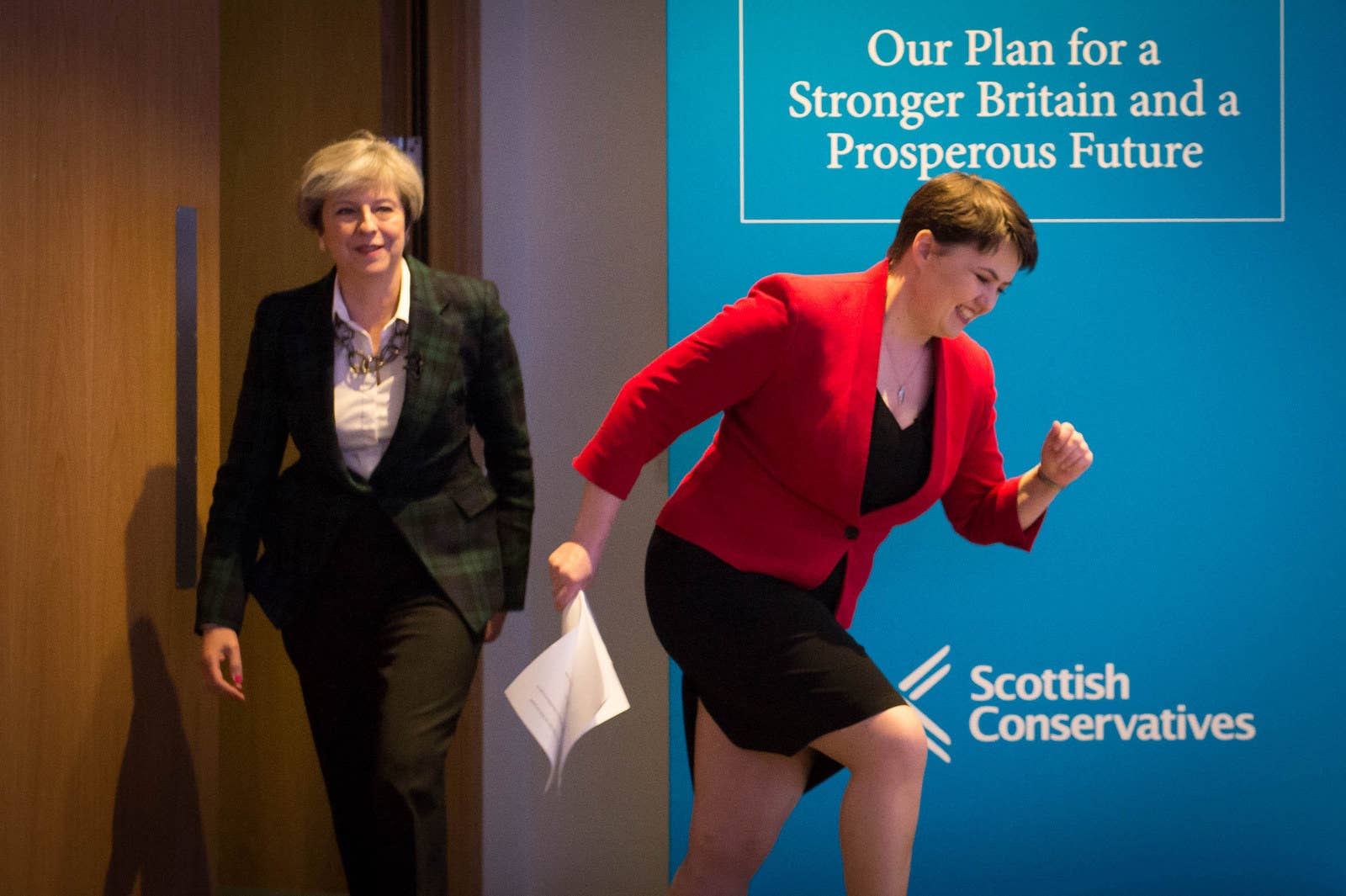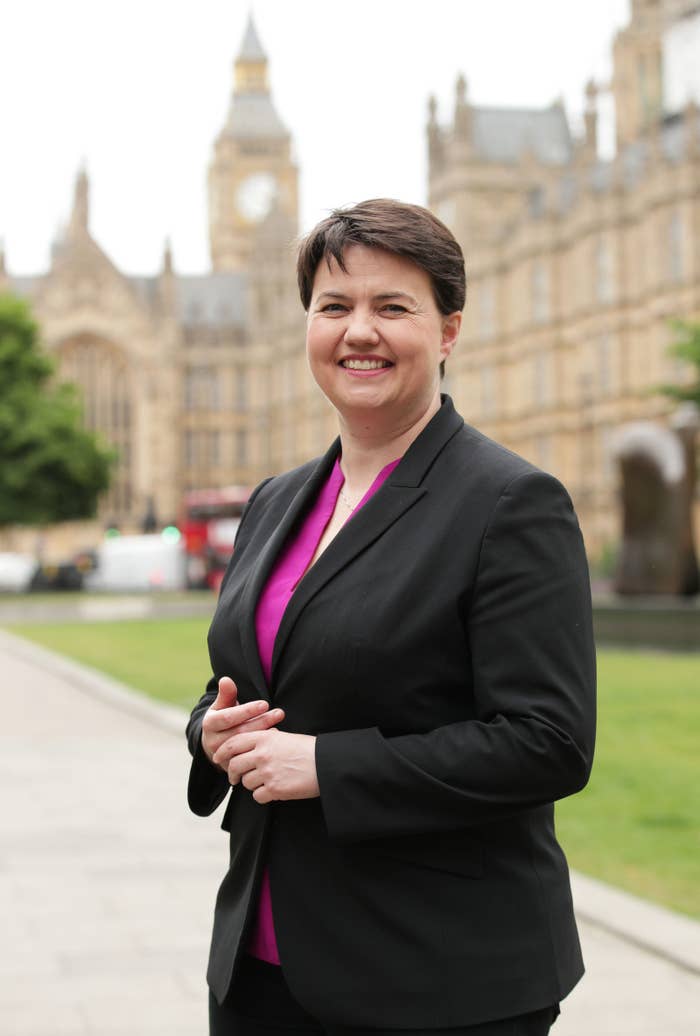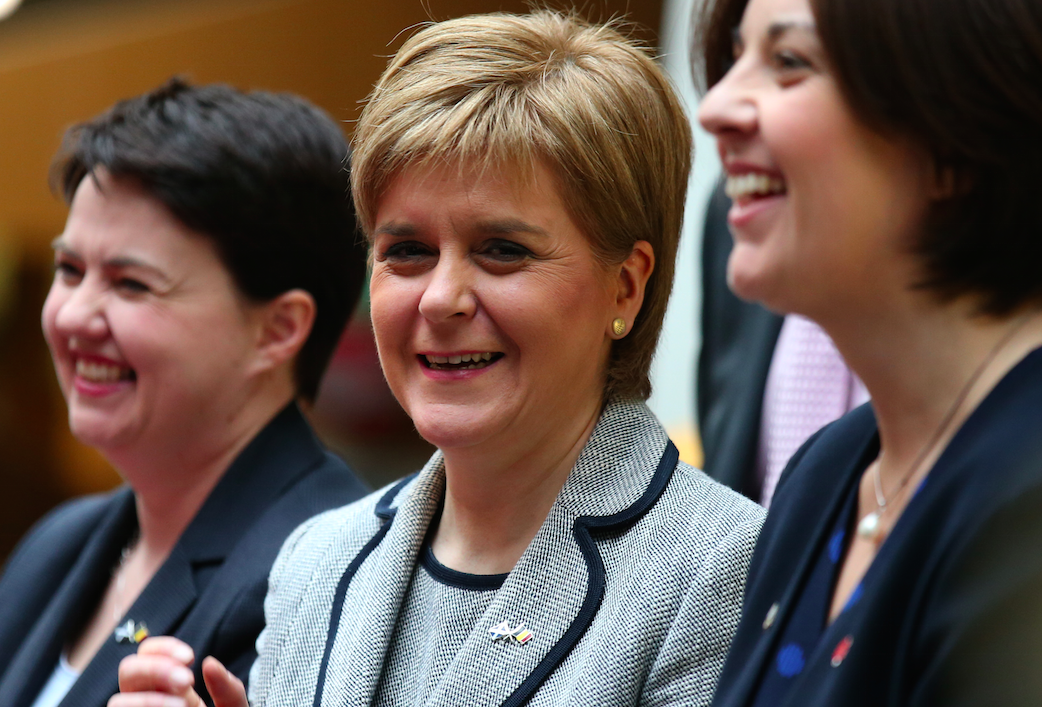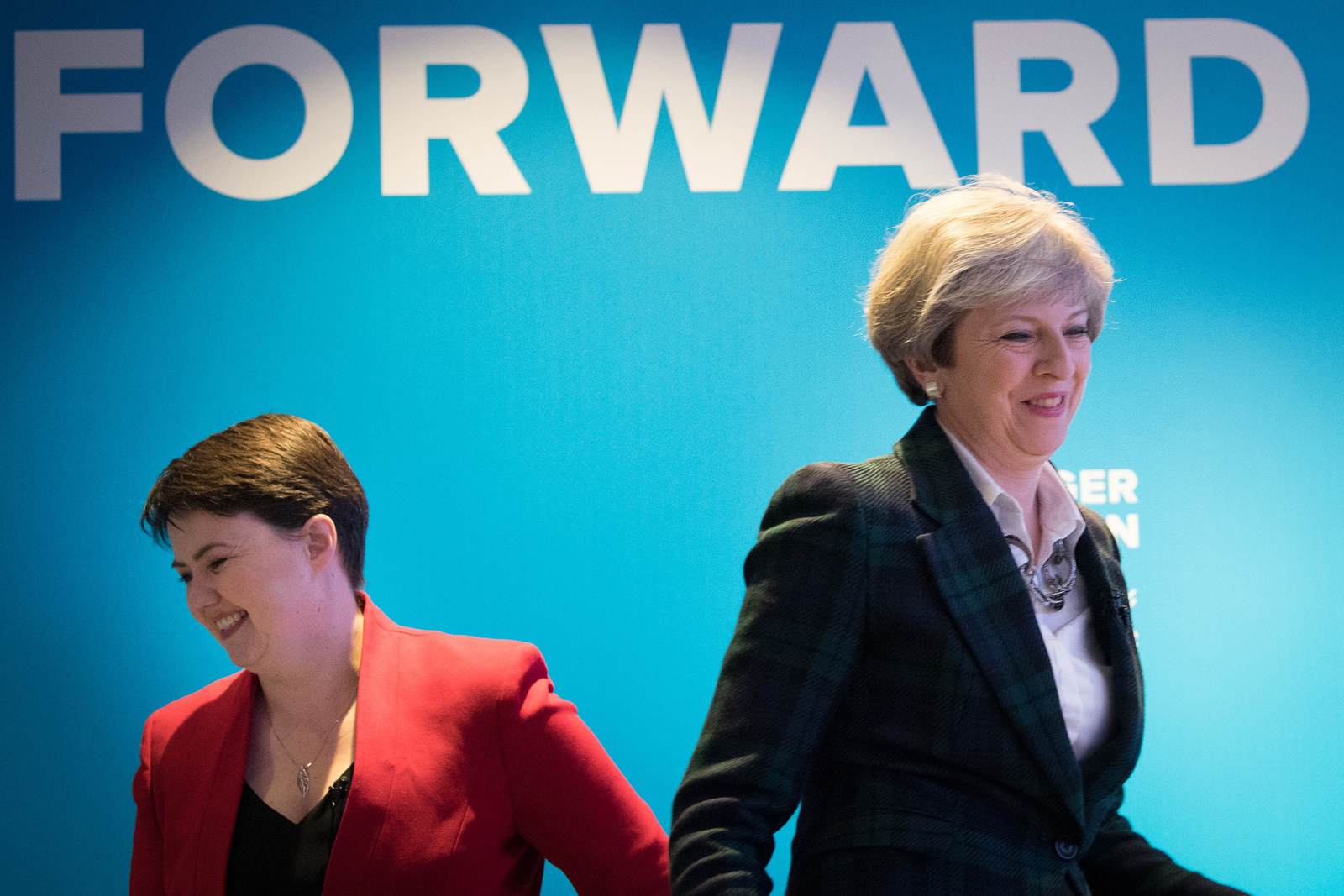
"Let me give Nicola Sturgeon this friendly advice," said the leader of the Scottish Conservatives, Ruth Davidson, when launching her party's manifesto on Friday morning alongside Theresa May. "The prime minister says she's a bloody difficult woman – well, you ain’t seen nothing yet."
It's not too long ago that such fighting talk from a Tory leader in Scotland would have been far easier to ridicule. But the party, which has long been the butt of Scotland's most overused joke comparing the number of their MPs (one) with the number of panda bears in Edinburgh Zoo (two), looks set for its best election result in decades when voters in Scotland schlep to the polling booths yet again next month.
The number of seats people in the party reckon they can snatch from the SNP differs wildly depending on where they've been knocking on doors. Those spending their time in rural areas in the northeast are the most optimistic, with guesses in the mid-teens, while the valiant souls who've been selected in the SNP's new city heartlands such as Glasgow and Dundee think it could be as low as four.

What does seems clear to everyone, however, is that if May is re-elected she will almost certainly have to spend more time thinking about who will be her next Scotland secretary than she would have if she was restricted to a choice of just one MP.
While the party lags miles behind the still-dominant SNP, its returns in opinion polls have doubled since the independence referendum of 2014 reset politics in Scotland, meaning the Tories are comfortably ahead of Scottish Labour heading into June's election. In the months after that referendum the Tories flailed on 15% or lower – but no poll over the past two months has placed the party lower than 29%.
‘The Conservatives go into the general election in Scotland in a more upbeat mood than for more than a generation," Mark Diffley, the Scotland director of polling company Ipsos Mori, told BuzzFeed News.
"In the four polls conducted since the election was called, average support for the Tories stands at 29%, almost double the 15% they notched up at the 2015 vote, meaning they are on course to do better north of the border than in any general election since 1979 when they reached 31%.
"These polling results, coupled with the recent local elections where the party gained 12 percentage points and 164 councillors from their 2012 performance, mean that expectations are high for the Tories to take a significant number of SNP scalps in June. Current polling suggests that they will take around eight seats."
People inside the party put this revival down to three things: the leadership of Davidson, who has become a major figure in UK politics particularly following last year's EU referendum; the disarray in the Labour party both in Scotland and more recently in the rest of the UK; and, ironically for a leader so eager to present herself as the complete antithesis of the Tories, Nicola Sturgeon's march to another independence referendum following last year's Brexit vote.
"From knocking on doors here, [the revival] seems it’s almost exclusively down to the unpopularity of a second independence referendum," the Conservative candidate for target seat Perth and North Perthshire, Ian Duncan MEP, told BuzzFeed News.

"After the last independence referendum, everything was in motion. In 2015, the SNP told people that general election wasn’t about independence – it was about 'holding the government's feet to the fire' and a progressive alliance and so on," he said.
"That worked for a period and I think the result in 2015 reflected that people thought independence was off the table. That's no longer the case. But we’ve also seen another process – in 2015, we saw the first stage of what was the absolute collapse of Labour."
Crucially, Davidson has been far more successful than her Scottish Labour counterpart, Kezia Dugdale, in convincing pro-union Scots that she will stand firmly against a second referendum on independence and, as such, has already cannibalised a big chunk of Labour's support in Scotland.
Labour maintained its lead over the Conservatives in Scottish general election voting intention polls until the latter half of 2016, when the prospect of another independence referendum was firmly back on the table. Since then, hampered by gaffes from Jeremy Corbyn along the way – he suggested he'd be "absolutely fine" with another independence vote – the gap has only grown.
At the manifesto launch on Friday, Davidson made a direct and unashamed attempt to win over the remaining 17% or so of Scots who still intend to vote Labour next month, insisting that while Labour may one day be in good shape again it's in "chaos" going into this election and supporters should temporarily lend their votes to the Tories.

Bringing up Scottish Labour's "civil war" in Aberdeen this week and the election of Corbyn as leader, who "was not your choice", Davidson said: "The truth is, your party has left you, not the other way around. It may well find its way back. But you know – and I know – it won’t be at this election, so let me do a job for you.
"In great swaths of the country, it is only the Scottish Conservatives who are strong enough to take on the SNP. And in many places we can only win, if you join with us. The Scottish Conservatives are rooted to the centre ground and – in the last year – have proven we can take on the SNP. We did it last May at the Holyrood elections and again a fortnight ago in the local government elections too."
Pollster Mark Diffley explained: ‘The turning point in the party’s performance appears to be the 2014 independence referendum. Since then they are widely seen to have been the most effective party at rallying the 55% who voted No around their central theme of preserving the union and opposing a second vote on Scotland’s constitutional future.
"It's clear from polling and recent local election results that their success has been primarily, though not exclusively, at the expense of Labour, many of whose supporters now see the Tories as the party most able to oppose the SNP and defend the union; over the period since the last election where Tory support has doubled, support for Labour has fallen from an already poor 24% in 2015 to an average of 17% in recent polls.
"Their rise in popularity has been aided by the leadership of Ruth Davidson, who has done much to detoxify the image of the party among voters; most recent polling suggests that 43% think she is ‘doing well’, second only and just behind Nicola Sturgeon at 47% and far exceeding the other party leaders at UK or Scotland level."

The prime minister, meanwhile, is seen as much more of an asset among her Scottish colleagues than David Cameron, who himself admitted, with his privileged background and refined southern accent, that he turned off some Scottish voters. May features prominently on the Scottish Conservative campaign materials and has been deployed strategically over the past few weeks – in Aberdeenshire and East Lothian – to marginal seats in an effort to tip the vote in the party's favour on 8 June.
For a long time, the received wisdom was that if a Conservative prime minister attempted to block a referendum on independence after the Scottish parliament had given its backing for one, the outrage at blocking "the will of the Scottish people" would force a hasty climbdown. No such outrage seems to have materialised and support for independence appears to be largely unchanged from 2014, despite the dramatic vote for Brexit in the meantime.
At Friday's manifesto launch, the prime minister spoke at length about the union, said that she would form a "unionist government", and insisted that keeping the UK together was her "personal priority" as leader.
"As long as I am prime minister," she told the gathered activists and journalists in Edinburgh, "I will never stand by and let our union drift apart."
"Only the Conservative and Unionist Party has the strength and credibility to stand up to the Nationalists and defend our United Kingdom," said May. "Jeremy Corbyn is too weak to stand up for our union, even if he wanted to. According to him, a second independence referendum would be ‘absolutely fine.’
"I have been clear that now is not the time for another independence referendum. This is a time to pull together, not apart. A vote for any other party is a vote to weaken our union, to weaken our negotiating hand in Europe, and to put our future prosperity and security at risk."
The prime minister's vocal unionism, as well as Davidson's constant repetition of the message that a vote for the Conservatives is a vote against another referendum, has left the SNP with difficulties in honing its own message for this election campaign as Sturgeon had spent the months leading up to it marching towards IndyRef2.

The SNP fears that, if it campaigns too heavily on independence, it will alienate those anti-independence voters who lent their support to the party in 2015, and, furthermore –because Sturgeon has made clear she would like an independent Scotland to be inside the EU – the 38% of Scots who voted Leave could be turned off too.
While Sturgeon has said the election isn't about independence, former first minister Alex Salmond has confused the message by saying Scots who voted for the SNP in June “will know that they are voting to support the right of the parliament to decide on the holding of the Scottish referendum”.
A former SNP minister told BuzzFeed News: "The Tories have had an easy campaign – bang on about independence, soak up unionists – and SNP haven't found their voice yet. The SNP could find it and go back up to 50%, though I can't for me conceive of a message right now that doesn't alienate at least one part of their 2015 backing."
Despite having a stickier campaign than the party is used to, the SNP is still likely to win by a big margin in June – albeit it with fewer seats than in 2015. For now, Davidson will have to be satisfied with consigning the panda joke to history and placing a sizeable obstacle in the way of another independence referendum.
However, the Scottish Conservative leader has spoken before about spending the next four years, until the next Holyrood election, turning her party into a "government in waiting" and ultimately replacing Sturgeon as first minister.
“I fully accept we are not there in people’s minds yet," she said previously. "There will be people reading this article who will say ‘She’s aff her heid.’ But see by the time the 2021 election comes around? I’ll be damn serious.”

